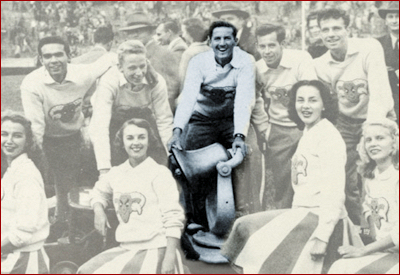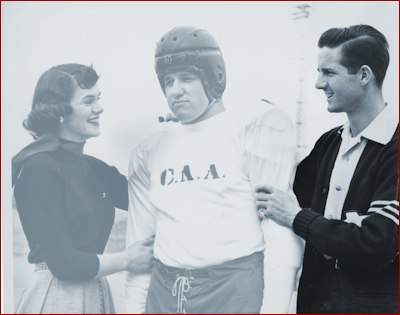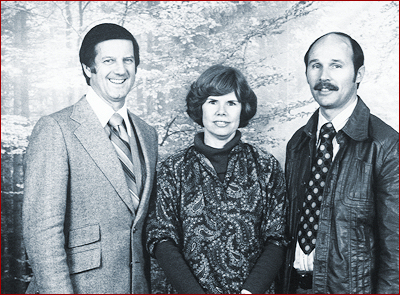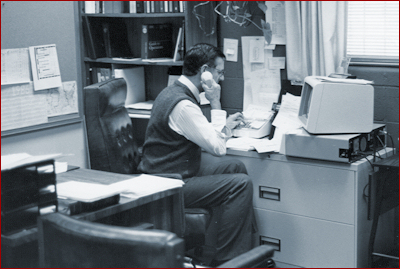by Dan Phillips
From 2009; Brian Thomasson (then of David C. Cooke) suggested that this post might be a good sparking idea for a book. I mulled it over, worked up a much larger vision, and the result was The World-Tilting Gospel, in which Chapter Twelve develops these ideas at greater length.
New year — new word!
Sarkicophobia.
Sar´-kĭ-kə-fō´-bē-ə
Derivation: In the NT, the term
σαρκικός (
sarkikos) is

commonly translated "fleshly" or "carnal." It is an adjective derived from
sarx, "flesh," and means belonging to the flesh, pertaining to the flesh. It occurs in Romans 15:27; 1 Corinthians 3:3 [twice]; 9:11; 2 Corinthians 1:12; 10:4; and 1 Peter 2:11. Sometimes it is used simply of material things (Romans 15:27; 1 Corinthians 9:11), and sometimes of attitudes or thinking that is dominated by the flesh (i.e. unredeemed, un-Christian thinking or attitudes; 1 Corinthians 3:3; 2 Corinthians 1:12).
Formation: Unlike
nomicophobia, there actually is an existing (if little-used) English word to use:
sarkic. The rest is easy.
Meaning: I would use this of folks who
so fear obeying God "in the power of the flesh" that they'd rather do
nothing, than do something
carnal. Whatever their
theory, their
practice can be summed up in this motto:
better to disobey God outright, than obey Him in the flesh! Or,
Better do nothing for God's glory, than do something fleshly for God's glory!
The result is not only paralysis, but a particularly repulsively and repugnantly
pious form of paralysis. You dursn't confront these folks for their
sin in
disobeying God. Do that, and you mark yourself as shallow and — well, carnal! Because clearly, you don't understand: when
they disobey God, it's
really because
they love God so much! It's because they just want Jesus to be all, and God to be all, and themselves to be nothing, like little lead soldiers melted down into the big molten vat of Godness.

It's the "thinking" that underlies the ever-popular (and never-Biblical) mantra for daily living:
Let Go and Let God.
Illustration: reading Andrew Murray and the "higher life" sorts will freeze you up like this. Murray will so terrify you of the

thought of acting in the flesh, that you'll collapse into goo. You will want to be a glove on Jesus' hand, moving only when He moves, dissolving into nothing that He may be all in all.
Among these folks, it's all clothed with (masked in?) gloriously spiritual and mystical language, and sounds absolutely wonderful. I mean — who
wouldn't want that? What Christian
wouldn't like to quit striving and struggling and battling and sweating and groaning... and
failing? What Christian
wouldn't like to be so mastered by Jesus that he lives and breathes and emanates Jesus, so that Jesus lives through Him
in the sense of replacing his will and responsibility?
Again, this is seen in the phrase:
"Stop trying to live the Christian life, and let Jesus live it through you!" Aside:
Aside: do you see, though, that this only moves the goal, the marker? It doesn't
remove it? The
idea is that I stop getting my grubby hands all over everything, and
let Jesus control everything.
Stop trying to do things right — in fact, that's the problem:
I keep trying to do things right. And that's wrong.
I have to stop trying, and
let Jesus do it.
Okay, so then... why isn't He? Who's stopping Him? Well, I am. Because I haven't
let Him right. I haven't
yielded right. I haven't
adopted the right resting, yielding attitude.
So you see, it's still me, me, me. It's just that we've moved the focus from my
obeying right, in faith and by grace (which is an explicitly Biblical focus), to my
yielding right (which is not). And I still fail, because I have to strike the right mystical attitude to shift into "J" for Jesus-life. If I'm not there, there's something more for
me to do.
So even apart from being un-Biblical, it's nonsensical. It collapses on itself.
Anecdote: I was infected with this very early in my Christian life. It seemed natural enough to me because of its similarity to the
cultic teaching from which I'd been saved. Then we believed

that God was all and in all, and we just needed to "manifest" the God-life. This teaching is very similar, only it focuses more on Jesus rather than the mysticized redefinitions of Religious Science.
So,
like J. I. Packer and many Americans as well, I tried and tried. That is, I tried
not to try. I tried to melt... er, that is, to
let myself be melted. (But wait, if I'm doing the not-doing... if it
takes me to
not take me to... whoa, like I said, this gets really confusing....) And,
like J. I. Packer, it made me pretty miserable.
But my circle of Christian friends was also infected, and we all had the same fear: acting "in the flesh." We were afraid of going to church
in the flesh, witnessing of Christ
in the flesh, praying
in the flesh, studying the Word
in the flesh, obeying the Word
in the flesh. So, for fear of doing any of those things
in the flesh, we'd stop doing them altogether. Some of us could be pretty smug about it, too, and could look down on others who were very energetically involved in church, witnessing, and holy living — but we were pretty sure that it was, you know,
in the flesh.

It came to a head for me in my first course of pastoral training. It's quite a long story in itself, but the bottom line is that I'd gone from being a lazy, undisciplined student before my conversion, to being very committed to immersing myself in Greek so as to master the New Testament.
But many of my fellow-students wouldn't. They wouldn't study too hard, get into it too deeply. Why? Whyever not?
You've already guessed: all that studying was
in the flesh.

The effect of
sarkicophobia on me was that I was ever taking my spiritual pulse, ever checking within, freezing up, paralyzed, spiraling down into deeper and deeper morbid introspection. In the name of "looking to Jesus" (revealed in His Word) I was constantly looking to myself, within myself.
And so what should I do? Should I leave off the hard, sweaty, grueling work of study and "let God," for fear of studying
in the flesh?
In short: God set me free. Somewhere around that time I began to realize how comparatively simple, straightforward, and in-broad-daylight New Testament Christianity was.
Never ever did you see an apostle or Christian on the side of the road, locked in a whirlpool of introspection over serving God by Spirit-enabled, faith-motivated, grace-empowered obedience to Gospel commands
in the flesh.
Nor did we
ever read of an apostle issuing a series of commands in Christ's name, then immediately cautioning his readers against obeying them
in the flesh.
Nor was the concept of
flesh introduced by Paul to make Christian living more complicated. True, he depicted the
fact that the flesh complicates Christian living (Romans 7:14-25); but he never
compounds the issue by horror-stories of grace-saved, born-again, Spirit-baptized Christians living for God's glory
in the flesh — as if it were some sort of indefinable mystical state of being, more powerful than the Holy Spirit and the new nature.
True, the apostles warned against pride, arrogance, lust, covetousness, divisiveness, bitterness and such things; and, true, these are works of the flesh (Galatians 5:19-21). But Paul says those works are "obvious, apparent, plainly evident" (Galatians 5:19).
Never would Paul have interrupted an aglow, on-fire, Christ-loving Christian from telling the Gospel, and told him to go to his closet and stop witnessing until he was sure he wasn't doing it
in the flesh.
And so I decided — about Greek and a great many other things. I'd give it everything God gave me to give, out of love for Christ, and to be of use to His church. And if it made me arrogant, I'd take
the arrogance to the Cross, and deal with it. And get on with keeping His commands.

Because that's what love for God
is (1 John 5:3), and that's what people who love Jesus
do (John 15:14)..
I wasn't going to use
sarkicophobia as an excuse to avoid all-out living for God's glory, through grace, by the Spirit's power, in obedience to the commands of God.
In sum: sarkicophobia creates people locked in perpetual self-absorption in the name of Christ, ever taking their spiritual pulse, immune to direct appeals from Scripture to believing obedience.
The last thing it produces is Christ-centered, God-glorifying, robust, hearty, daring, fruitful, pioneering, world-rejecting Devil-defying Christians.
And that's a
bad thing.


 oday Tim Challies has an item about James MacDonald's decision to invite T. D. Jakes to participate at Elephant Room 2. Some of Tim's commenters think it's a fine idea for MacDonald to extend a cordial welcome to someone whose teaching is highly suspect so that he can define and defend himself.
oday Tim Challies has an item about James MacDonald's decision to invite T. D. Jakes to participate at Elephant Room 2. Some of Tim's commenters think it's a fine idea for MacDonald to extend a cordial welcome to someone whose teaching is highly suspect so that he can define and defend himself.











 posted a couple of links in my Twitter feed last week and a vigorous discussion ensued. Because the controversy surrounding the following video clips deals with fundamental matters of ministry philosophy, pastoral propriety, the purity of the church, and the difference between true worship and "strange fire"—and since Twitter's 140-character limit simply isn't enough to let me even begin to say what I think needs to be said about this—I decided to take it up on the blog today.
posted a couple of links in my Twitter feed last week and a vigorous discussion ensued. Because the controversy surrounding the following video clips deals with fundamental matters of ministry philosophy, pastoral propriety, the purity of the church, and the difference between true worship and "strange fire"—and since Twitter's 140-character limit simply isn't enough to let me even begin to say what I think needs to be said about this—I decided to take it up on the blog today.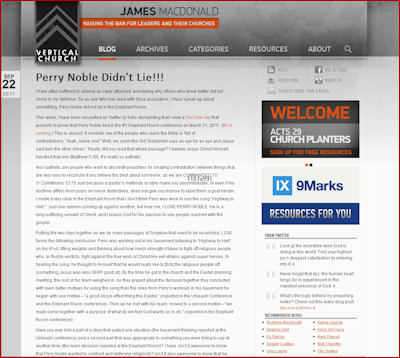
 I don't know (nor do I care) if Perry Noble is "lying" in that second clip. He could indeed merely be making the argument that the first clip doesn't actually tell the full story. I wouldn't (and didn't) accuse him of lying.
I don't know (nor do I care) if Perry Noble is "lying" in that second clip. He could indeed merely be making the argument that the first clip doesn't actually tell the full story. I wouldn't (and didn't) accuse him of lying. All the word-play and energy that has been put into defending Noble feels like a bad caricature concocted to demonstrate everything that's wrong with postmodernism. Someone who raises no objection when a egomaniacal pastor boasts about looking for ways to offend and irritate other Christians has no moral ground to complain about the "tone" or biases of those who are offended. But the postmodernist spends hours attacking them anyway, exegeting the mischief-loving fellow's braggadocio, making useless arguments about words, in order to defend the honor of the guy who admitted that from the very start his main intention was to offend?
All the word-play and energy that has been put into defending Noble feels like a bad caricature concocted to demonstrate everything that's wrong with postmodernism. Someone who raises no objection when a egomaniacal pastor boasts about looking for ways to offend and irritate other Christians has no moral ground to complain about the "tone" or biases of those who are offended. But the postmodernist spends hours attacking them anyway, exegeting the mischief-loving fellow's braggadocio, making useless arguments about words, in order to defend the honor of the guy who admitted that from the very start his main intention was to offend?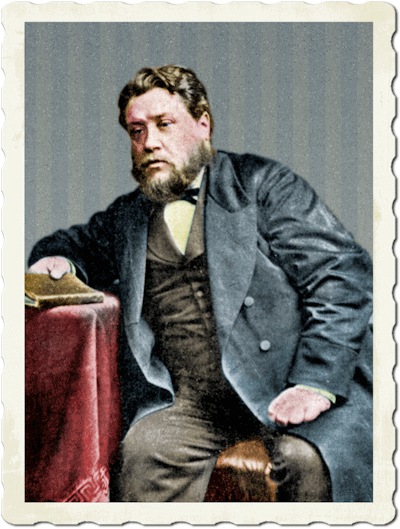
 f you really long to save men's souls, you must tell them a great deal of disagreeable truth.
f you really long to save men's souls, you must tell them a great deal of disagreeable truth.









 Yes, I get it: that's ugly. That is also the way it goes when you join a marketing group: you have to somehow get past the 20% junk and somehow capitalize on the 80% better-than-junk to try to get people to come back into the store.
Yes, I get it: that's ugly. That is also the way it goes when you join a marketing group: you have to somehow get past the 20% junk and somehow capitalize on the 80% better-than-junk to try to get people to come back into the store.
 term chazon used in this way. It just isn't. But you will find a consistent use of the term to indicate prophetic revelation, such as we have today in Scripture alone (cf. Isaiah 1:1; Daniel 8:1, 15; Hosea 12:11; Obadiah 1; Nahum 1:1, etc.).
term chazon used in this way. It just isn't. But you will find a consistent use of the term to indicate prophetic revelation, such as we have today in Scripture alone (cf. Isaiah 1:1; Daniel 8:1, 15; Hosea 12:11; Obadiah 1; Nahum 1:1, etc.). anvil of far too much experience. My beloved wife is very goal-oriented, and she's superb at setting terrific goals. I remember a day she engineered at Disneyland with our (then) two children, and it was like the most precise ballet, starting at 8am and ending at 2am. What we packed into those hours makes for a breath-taking memory. Well over a decade later, I still marvel.
anvil of far too much experience. My beloved wife is very goal-oriented, and she's superb at setting terrific goals. I remember a day she engineered at Disneyland with our (then) two children, and it was like the most precise ballet, starting at 8am and ending at 2am. What we packed into those hours makes for a breath-taking memory. Well over a decade later, I still marvel.
 am often sadly tossed about because of the heresies and false doctrines of this present age. It grieves me to the heart to see the want of spirituality among ministers, and of holiness among professing Christians. It cuts me to the quick to see the utter rubbish and poison which is preached instead of Christianity.
am often sadly tossed about because of the heresies and false doctrines of this present age. It grieves me to the heart to see the want of spirituality among ministers, and of holiness among professing Christians. It cuts me to the quick to see the utter rubbish and poison which is preached instead of Christianity.

 orm Sper went to heaven Wednesday night.
orm Sper went to heaven Wednesday night. but chose instead to attend the University of North Carolina at Chapel Hill, where he led the UNC swimming and diving team, setting NCAA records with his diving and backstroke performances. Norm was a four-time first-team All-American (1947-1950), the first in UNC history. He was chosen for the United States' Olympic diving team, but because of World War II the 1940 and 1944 Olympics were canceled, so Norm never swam or dived as an Olympian, though he was arguably the best diver in the world through most of the 1940s.
but chose instead to attend the University of North Carolina at Chapel Hill, where he led the UNC swimming and diving team, setting NCAA records with his diving and backstroke performances. Norm was a four-time first-team All-American (1947-1950), the first in UNC history. He was chosen for the United States' Olympic diving team, but because of World War II the 1940 and 1944 Olympics were canceled, so Norm never swam or dived as an Olympian, though he was arguably the best diver in the world through most of the 1940s.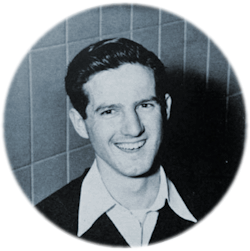 During those years at UNC, Norm repeatedly was elected as head cheerleader. The position perfectly suited his upbeat and always optimistic personality. He is remembered to this day in Chapel Hill as one of UNC's most popular cheerleaders ever.
During those years at UNC, Norm repeatedly was elected as head cheerleader. The position perfectly suited his upbeat and always optimistic personality. He is remembered to this day in Chapel Hill as one of UNC's most popular cheerleaders ever.